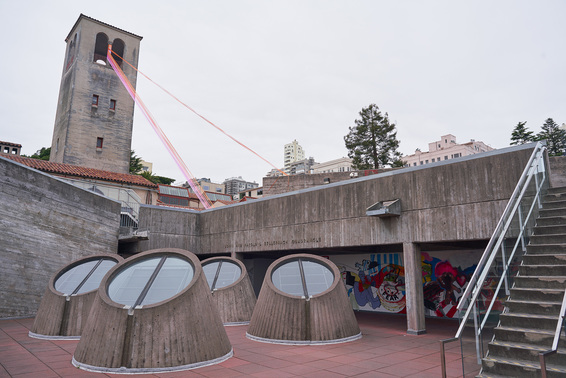
R
E
V N
E
X
T
On March 23, San Francisco Art Institute (SFAI) announced that it will not enroll any new students for the fall of 2020, and will likely cease all educational programs after graduating students receive their degrees in May, in addition to laying off its faculty and staff. The 149-year-old private art institute is facing a shutdown amid pre-existing financial turmoil escalated by the onset of the global Covid-19 pandemic.
The March 23 letter, signed by president Gordon Knox and chair of its board of trustees, Pam Rorke Levy, revealed that SFAI “has been aggressively pursuing a number of strategies that would ensure long-term financial sustainability for our school,” the primary option being to “[merge or collaborate] with another larger educational institution.” SFAI noted “promising negotiations” with two institutions in the Bay Area, but talks have been put on hold “as each partner turned its undivided attention to the immediate and still unknown future impacts [of Covid-19] on their campus communities.” According to KQED, members of the art community surmise that the University of San Francisco was one of the two interested parties.
SFAI is one of the United States’ oldest higher-education institutions dedicated to contemporary art. With its diverse faculty and student body, as well as its multicultural focus, SFAI has contributed to Asian American and global arts discourses. Renowned alumni include the late Filipino-American artist Carlos Villa (1936–2013), who later taught at the Institute, where he launched the exhibition and symposia series “Sources of A Distinct Majority” (1989–91), building on his long-term project on art, activism, and identity politics, Worlds in Collision (1976–2013). Other notable graduates are graffiti artist Barry McGee, abstract painter Leo Valledor, and photographer Catherine Opie, among others. Hou Hanru, independent curator and director of the MAXXI museum in Rome, was once SFAI’s director of exhibitions and public programs, and chair of exhibition and museum studies.
SFAI has been suffering from a fall in enrolment and financial debt, which, according to Pam Rorke Levy, is estimated to be around USD 19 million. As reported by the New York Times, the institution forwent plans to expand student residences this year. The school is already closed due to Covid-19, with current classes moved online. Although the letter indicates that the school is “in negotiations with our faculty and staff unions now about the feasibility of continuing classes” beyond May, staff have been receiving Worker Adjustment and Retraining Notification Act notices, which are required 60 days in advance of potential mass layoffs, according to KQED. Meanwhile, SFAI is also encouraging students to continue their education elsewhere despite the “formidable timing challenge,” since admission deadlines have passed for many universities.
Covid-19 has had a large impact on education, forcing many institutions worldwide to shift to online programs. Additionally, suspensions of air traffic due to the disease mean schools and universities around the world are facing a drop in the number of international students—who pay hefty tuition fees—in the upcoming academic year.
Earlier this month, the Savannah College of Art and Design (SCAD) announced that it will shutter its Hong Kong branch, which has been struggling financially for years, in June due to concerns over the spread of Covid-19.
Pamela Wong is ArtAsiaPacific’s assistant editor.
To read more of ArtAsiaPacific’s articles, visit our Digital Library.













